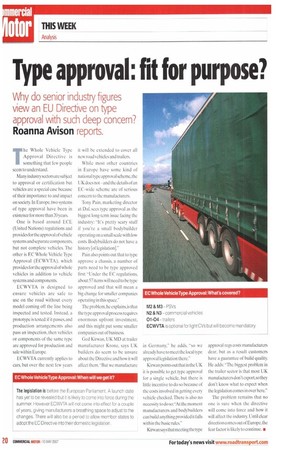Type approval: fit for purpose?
Page 20

If you've noticed an error in this article please click here to report it so we can fix it.
Why do senior industry figures view an EU Directive on type approval with such deep concern?
Roanna Avison reports.
he Whole Vehicle Type Approval Directive is something that few people seem to understand.
Many industry sectors are subject to approval or certification but vehicles are a special case because of their importance to and impact on society. In Europe. two systems of type approval have been in existence for more than 20 years.
One is based around ECE (United Nations) regulations and provides for the approval of vehicle systems and separate components, but not complete vehicles. The other is EC Whole Vehicle Type Approval (ECWVTA). which provides for the approval of whole vehicles in addition to vehicle systems and components.
ECWVTA is designed to ensure vehicles are safe to use on the road without every model coming off the line being inspected and tested. Instead, a prototype is tested: if it passes, and production arrangements also pass an inspection, then vehicles or components of the same type are approved for production and sale within Europe.
ECWVTA currently applies to cars, but over the next few years it will be extended to cover all new road vehicles and trailers.
While most other countries in Europe have some kind of national type approval scheme, the UK does not -and the de tails of an EC-wide scheme are of serious concern to the manufacturers.
Tony Pain, marketing director at Daf. sees type approval as the biggest long-term issue facing the industry: "It's pretty scary stuff if you're a small bodybuilder operating on a small scale with low costs. Bodybuilders do not have a history [of legislation]."
Pain also points out that to type approve a chassis, a number of parts need to be type approved first: "Under the EC regulations, about 57 items will need to be type approved and that will mean a big change for smaller companies operating in this space," 'The problem, he explains, is that the type approval process requires enormous upfront investment, and this might put some smaller companies out of business.
Ged Kirwan, UK MD at trailer manufacturer Krone, says UK builders do seem to he unsure about the Directive and how it will affect them. "But we manufacture in Germany." he adds, "so we already have to meet the local type approval legislation there."
Kirwan points out that in the UK it is possible to get type approval for a single vehicle, but there is tittle incentive to do so because of the costs involved in getting every vehicle checked. There is also no necessity to do so:"At the moment manufacturers and bodybuilders can build anything provided it falls within the basic rules."
Kirwan says that meeting the type approval regs costs manufacturers dear, but as a result customers have a guarantee of build quality. He adds: "The biggest problem in the trailer sector is that most UK manufacturers don't export,so they don't know what to expect when the legislation comes in over here."
The problem remains that no one is sure when the directive will come into force and how it will affect the industry. Until clear direction comes out of Europe, the fear factor is likely to continue.






















































































































































































